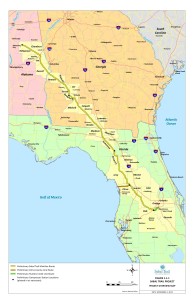What if the Industrial Authority used its bond-issuing power
to finance rooftop solar?
And what if it combined that with utility-scale solar projects
on its own industrial park lands, and for example at the airport,
or at the new Withlacoochee Wastewater Treatment Plant?
Here’s the idea, in a report by
Citi GPS,
Energy Darwinism: The Evolution of the Energy Industry,
October 2013,
pages 48-49,
 It is not just the technology that is evolving in the solar
industry; the financing of solar projects, both residential and
utility-scale is evolving quickly. The most notable development here
has been in the form of solar leasing, whereby the rooftop panels
are owned by a third party who effectively leases the rooftop from
the home/factory/office owner, the latter receiving payment normally
through a reduction in electricity bills paid for by the lessee.
This provides the benefits of cheaper and cleaner solar electricity
to the homeowner, whilst negating the need for the significant
initial capital outlay. The panel owner or lessee earns their return
via incentive mechanisms such as the U.S. Investment Tax Credit, and
via the sale of the electricity back to the local utility. This
financing mechanism has proved particularly successful in the U.S.
and is gaining traction in the UK, with companies in other countries
looking to follow suit.
It is not just the technology that is evolving in the solar
industry; the financing of solar projects, both residential and
utility-scale is evolving quickly. The most notable development here
has been in the form of solar leasing, whereby the rooftop panels
are owned by a third party who effectively leases the rooftop from
the home/factory/office owner, the latter receiving payment normally
through a reduction in electricity bills paid for by the lessee.
This provides the benefits of cheaper and cleaner solar electricity
to the homeowner, whilst negating the need for the significant
initial capital outlay. The panel owner or lessee earns their return
via incentive mechanisms such as the U.S. Investment Tax Credit, and
via the sale of the electricity back to the local utility. This
financing mechanism has proved particularly successful in the U.S.
and is gaining traction in the UK, with companies in other countries
looking to follow suit.
This is what
Southern Company CEO Tom Fanning suggested back in May that SO might do.
But we don’t have to wait on Southern Company or Georgia Power.
At the utility scale level, the emergence of innovative financing
vehicles such as green bonds Continue reading →
 Sombody should tell Georgia Power and Southern Company
they’re still pushing a dead power source.
It’s time to go from far-too-expensive nuclear directly
to solar onshore and wind offshore.
Sombody should tell Georgia Power and Southern Company
they’re still pushing a dead power source.
It’s time to go from far-too-expensive nuclear directly
to solar onshore and wind offshore.



















